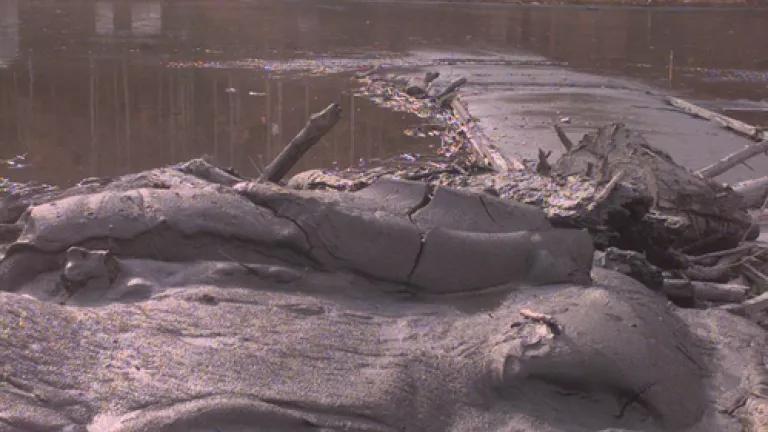New Film Tells the Story of West Virginians Fight Against Mountaintop Removal Coal Mining

A couple of years ago, I flew over mountaintop removal coal operations in Kentucky, and I saw the enormous scale of the destruction wrought by this kind of mining. Last week, I saw an amazing film that showed again the scale of this needless and heedless environmental devastation and revealed the quieter, more personal damage it does to the people who live next door, downstream, or downwind.
The Last Mountain, which premiered at Sundance and is now in national release, was made by Bill Haney, a director of the NRDC Action Fund. Haney lets the people around Coal River Mountain in West Virginia tell their own stories.
They describe hearing explosives detonate day and night, choking on dust from the blasting, watching flood waters pour down of the mines and into homes, and seeing beloved mountains, forests, and streams get devoured by coal companies.
Coal sludge spill in 2000, Martin City, Kentucky. Photo by Bud Kraft.
We watch as community members and a fifth-grade girl – her grandfather, a miner turned health advocate, was my favorite character in the movie – fight to protect an elementary school from the earthen dam perched right behind it, a dam that holds back 2.8 billion gallons of coal sludge, uranium, arsenic, and heavy metals. One community member calls it’s a “hornets’ nest sitting over the school.”
We hear a man say that he and his son’s families are the last two living in Lindytown, West Virginia, since the coal companies have encouraged everyone else to leave. He’s been there since 1946 and despite the explosions and falling boulders, he says, “I decided that I would endure.”
That man worked in coal mines himself, and many of the people in the film have deep roots in the coal mining industry. Many of those jobs are gone now. Even though West Virginia coal companies increased production by more than 140 percent in the last 30 years, they have eliminated 40,000 jobs.
Residents know mining doesn’t have to be this destructive. One company alone, Massey, had 60,000 violations of environmental laws between the years of 2000 and 2006.
Throughout the film, representatives of the coal industry respond to any challenge by saying, “Well, you use electricity don’t you?” But there are other ways to get coal and there are other ways to make electricity that do not entail 60,000 instances of breaking the law.
To say that since people need electricity, the ends justifies the means is the worst sort of argument to make—think of what that has justified throughout history.
The film consistently lays bare the coal industry’s compromised logic. At one point NRDC Senior Attorney Bobby Kennedy Jr. sits down with Bill Raney, the president of the West Virginia Coal Association. Raney says coal companies restore their mining sites and that “the people in my industry are practicing environmentalists.” (Watch Kennedy talk about the film on last Wednesday’s Colbert Report here.)
I recall going to so-called reclaimed mountaintop removal site. It was nothing more than a rock strewn, table-flat, barren expanse with hydro-seeded grasses kept alive only with irrigation just long enough to get the bond back. In the film, company representatives proudly point to similarly denuded landscapes and say they are “back to original contour.” That he was willing to say that on camera without irony or shame shows the degree to which they have lost touch with reality.
But we should be used to shocking assertions from coal representatives. Don Blankenship, the CEO of Massey Energy, is the master of ignoring reality. The film shows him proclaiming that the Earth is actually cooling and the Arctic ice is not melting. Whatever one might say about politics, facts are facts and they can’t be denied. He may as well be saying the Earth is flat.
The fact that Blankenship can say such things and that no one shouts him down says a lot about the moment we are living in, when people make up falsehoods to benefit their greed.
The Last Mountain burns through industry misrepresentations and reveals the facts. And the people who tell their stories in the film make it clear that mountaintop removal coal mine is destroying Appalachia not so we can light on the lights, but so coal companies can earn maximum profits for the least amount of investment.
I urge you to see this movie and share it with your friends. Find out where The Last Mountain is playing near you. And ask President Obama to end mountaintop removal mining once and for all.